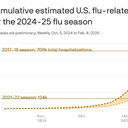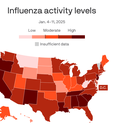U.S. facing worst flu season since 2009, experts say
The worst flu season in 15 years has left hundreds of thousands of Americans hospitalized while straining physicians' offices and emergency departments.
Why it matters: The virus is causing more severe complications and hitting young children especially hard.
"The two predominant strains that are circulating right now are known to be more severe and have more severe outcomes, especially in high-risk patients," said Carol McLay, president of the Association for Professionals in Infection Control and Epidemiology.
- "It's really clogging up our ERs and our outpatient facilities. And for the first time, we've seen cases of influenza that have surpassed COVID-19 in hospitalizations and deaths, since the COVID pandemic began," she said.
By the numbers: This flu season is classified as a "high-severity" season, with estimates of at least 29 million cases, the most since the 2009-2010 flu season, according to the latest Centers for Disease Control and Prevention data.
- There have been at least 370,000 hospitalizations, and 16,000 deaths from flu as of Feb. 8, per the CDC. That's on a pace to surpass the previous high recorded during the 2017-2018 flu season.
- Nearly every state is reporting high or very high flu activity, with roughly 32% of tests coming back positive and some areas testing as high as nearly 40% positive.
- "It's lots of more severe illnesses. Of the adults that are being hospitalized, most of them are having pneumonia and requiring intubation and ventilation," McLay said.
Of particular concern is the severity being seen in kids this year. There have also been reports of a limited number of pediatric cases with serious neurological complications associated with the flu.
- There have been 68 flu deaths in kids.
- Pediatric flu deaths hit a record 200 last year, and this season is shaping up to be worse, said Matthew Cook, president and CEO of Children's Hospital Association.
Between the lines: This flu season may be made more severe because rates of seasonal flu vaccination have been falling in recent years for some groups, including children.
- Compounding the problem is the fact that this year's flu vaccine was a bit less effective (35%) than in a typical year (45%).
- People have also had much less exposure to flu in recent years amid the COVID-19 pandemic.
- "We think because people were social distancing and using masks for so long during COVID that we have reduced immunity to it," McLay said.
What we're watching: Public health officials say they are increasingly flying blind since they can't interact with or get flu data from global sharing platforms FluNet and FluID since the Trump administration announced the U.S. exit from the World Health Organization.
- "We are communicating with them but we haven't heard anything back," Maria Van Kerkhove, emerging diseases and zoonoses unit head for the WHO, said in a press conference.
- She added that the WHO had learned about bird flu updates not from the CDC, but from posts by the U.S. Department of Agriculture.
- That also has ramifications for next year's vaccine, since the global body helps determine the composition of seasonal shots.
This especially rough year for season flu coincides with the spread of avian flu throughout U.S. poultry and dairy farms, as well as wildlife.
- The fear is if the two have enough chances to mix, it may eventually create an avian flu strain that could spread between humans and turn into a pandemic.
The bottom line: There's a lot of respiratory virus still going around this season. If you haven't gotten the vaccine yet, it'd still be prudent to get one, experts urge.
- "There is no doubt, the data is out there, if you are vaccinated for the flu, even if you do get the flu, it is much less severe and it prevents you from being hospitalized and, obviously, prevents death as well," McLay said. "It's not too late to go out and get a flu vaccine."







/2025/02/03/1738592743048.gif)




























